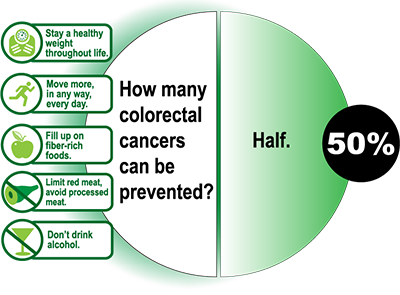Three years ago, when studies appeared in the British medical journal The Lancet suggesting that low-dose aspirin intake was protective against cancer, we offered our take as a cancer prevention and education organization:
“AICR’s focus is on the relationships of diet, nutrition, physical activity and weight to cancer. As such, we take no position on the effect of aspirin — a drug — on cancer risk, although we of course watch this research with interest.”
We went on to wonder if other health experts would one day offer official advice to take aspirin daily for lower cancer risk.
Yesterday, in a draft statement, the US Preventive Services Task Force did just that for colorectal cancer.
The statement is not final; it’s the first step in a process whereby the Task Force seeks public input before it makes a final recommendation. In addition, the Task Force’s draft recommendation with respect to cancer risk is not a sweeping one — it limits itself to colorectal cancer, and only applies to adults aged 50 to 70.
Even so, it’s a big deal – the first time any health authority has issued a recommendation on aspirin and cancer. That’s why it’s generating the news coverage it has — and why it’s proving controversial.. The New York Times WELL blog has a nice write-up that covers the main points, and gets quotes from experts who believe the Task Force is going too far.
As for AICR, our focus hasn’t changed. We still uniquely focus on the roles of diet, weight and physical activity in cancer risk, and we will still not be taking any position, for or against, on the use of a drug like aspirin for lowering risk.
But it’s worth remembering the clear and convincing evidence AICR has championed, which shows that many cancers are preventable by eating diets high in plant foods, getting regular physical activity, and maintaining a healthy weight.
 In fact, when it comes to colorectal cancer, our experts estimate that those lifestyle factors could prevent 50% of US cases — over 66,000 every year. And because colorectal cancer can take decades to develop, starting these healthy lifestyle habits early in life is important.
In fact, when it comes to colorectal cancer, our experts estimate that those lifestyle factors could prevent 50% of US cases — over 66,000 every year. And because colorectal cancer can take decades to develop, starting these healthy lifestyle habits early in life is important.
What’s more, adopting this healthy lifestyle comes with no risk of stomach bleeding, stroke or brain bleeds. In fact, the only side effects observed with following AICR’s Recommendations for Cancer Prevention are lower risk of obesity, cardiovascular disease, diabetes, and a host of other chronic conditions.






I was advised to take a baby aspirin every day. I started brusing and he advised to skip to every other day. As for the colon nothing was mentioned. I am 75yrs old and wonder now if I shoul continue this aspirin?